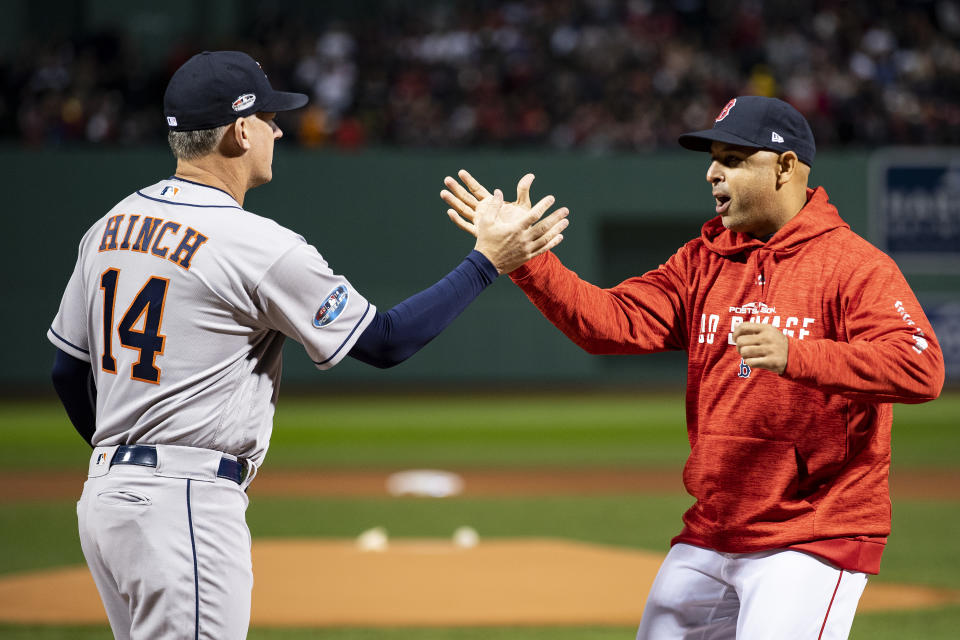Worth It? Does MLB's reaction to Astros, Red Sox tainted titles mean cheaters can prosper?
The 2017 World Series champion Houston Astros are cheaters. We already knew that.
The 2018 World Series champion Boston Red Sox cheated a bit too. Less than the Astros, but enough that MLB on Wednesday docked them a draft pick and suspended one of their staffers for the year.
And for the second time, no players were suspended.
So much for the sanctity of the game, right?
We can argue about who knew what, who didn’t, who authorized this, who should have been paying more attention to that. But this might be a case where too much nuance makes us miss the larger point.
Two out of the last three World Series titles are now tarnished. The 2018 Red Sox win doesn’t have nearly the same asterisk on it that Houston’s 2017 title does. Nonetheless, you think that’s going to stop rival fans from calling them cheaters?
Baseball fans don’t forget quickly. More than 20 years removed from the thick of the steroid era and what’s the immediate reaction fans have when a player goes on a home-run surge? That he must be on PEDs. Even if it’s just a joke, it’s still indicative of the distrust that baseball fans have adopted as a default stance over the past three decades.
The game loses a bit of the magic when you can’t believe what you see with your own eyes. It’s not pro wrestling, after all, it’s baseball — America’s pastime. But wrestle with this, we must. This scandal is the biggest baseball has seen since the PED days and perhaps the biggest ever. And what’s the carnage been?
Three managers out of a job, two of them suspended for a season. One GM fired and suspended. A $5 million fine for the Astros. Some lost draft picks.
In the grand scheme of things? Not a bad trade for two World Series titles, don’t you think?

In Boston’s case, the league found that J.T. Watkins, the team’s video replay operator, was passing along signs he decoded in the replay room to players on the bench. The system wasn’t a real-time, trash-can-banging ordeal like the Houston Astros were using, but it was still outside the bounds of what’s legal.
You could chalk this up to the collateral damage that comes with enhanced instant replay and MLB’s failure to keep a watchful eye on these things — and you wouldn’t be wrong — but it’s also the exact sort of thing commissioner Rob Manfred warned teams not to do. So some punishment is warranted.
Watkins’ job allowed him to decode signs following the previous game and report his findings to players before the game started. That sort of sign “stealing “is allowed by MLB. The problem in Boston was that Watkins also manned the replay room, which gave him a front-row seat to the new signs as they were happening. And ultimately tempted him to share that information with players during the game.
MLB’s report said that more than 30 of the 44 players interviewed didn’t have knowledge of what Watkins was doing. A smaller number did say that he passed along new information during games. And there are only nine batters in a lineup.
In the Red Sox investigation, like with the Astros, no players were suspended. This time, Manfred even said his findings wouldn’t have led him to suspend any players, even if he hadn’t already traded immunity for honesty. That same deal is what kept Astros players from getting punished.
Is that the lesson in all this? Cheat and win a World Series, but just tell the truth about it when the whole world finds out. You think most people in baseball would make that trade?
Sports, by nature, are about the greatest athletes in the world pushing themselves to the brink to win at the highest level. They’re not about living in a comfortable pocket of safety. It’s why players take PEDs. It’s why teams like the Astros and Red Sox have rocket-science smart employees decoding signs of developing algorithms aimed at getting every single bit of an advantage they can over the other team.
That’s the mentality that leads to what we’ve seen with the Astros and Red Sox, and other teams that exist somewhere on the axis between trying-to-do-everything-to-win and blatant cheating.
The question now is whether what we’ve seen the past few months — from the punishments, the firings and the fines, to the memes, the signs and the change in public perception — will make teams re-evaluate what’s worth giving up for the ultimate prize.
Jim Crane, the Astros owner, who had just dismissed the GM and manager who won a World Series in 2017 and led a team to the World Series in 2019, said back in January that Houston’s title wasn’t tainted.
Sam Kennedy, the Red Sox CEO, said about the same Wednesday. Asked whether the team’s 2018 title was tainted, he said, “No. No. Not at all.”
Neither of them are volunteering to take down their World Series flags, give back their trophies or take off their rings. So maybe that’s your answer.
Teams may lose a staffer or say goodbye to a good manager. Players will come clean once everybody already knows what happened, and hope everybody forgets by the time the next season starts and the next scandal takes over Twitter.
So was it all worth it? It makes you wonder.
More from Yahoo Sports:

 Yahoo Movies
Yahoo Movies 
